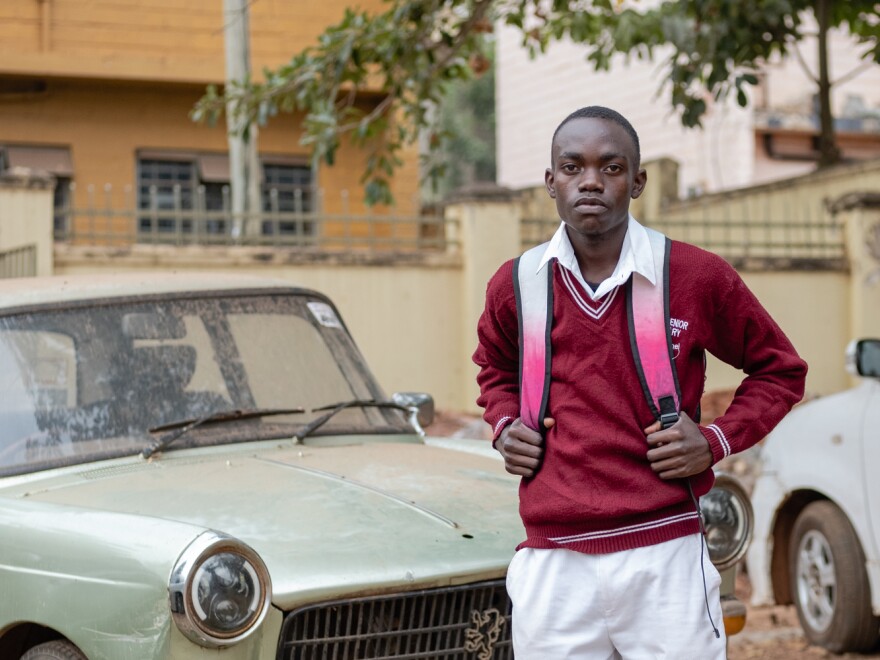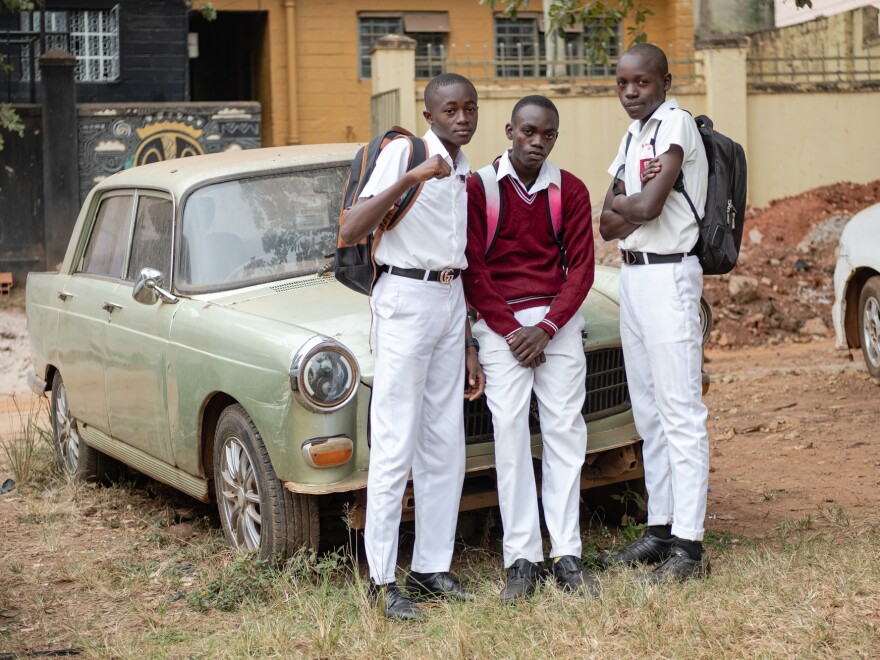KAMPALA, Uganda — On January 10, Uganda reopened schools after the longest closure in the world due to the coronavirus pandemic. For most students, it was their first time back in the classroom in nearly two years.
When the buildings first shuttered, the Ministry of Education broadcast lessons on TV and radio stations, and some schools handed out printed materials. But this did not last due to lack of funding. So the estimated 15 million children affected by this closure put their studies on hold.
Uganda's National Planning Authority in August 2021 projected that 4.5 million of them will likely not return to school. There are several reasons for the dropouts. The teen pregnancy rate rose significantly. According to a report released by the U.N. in 2021, close to 645,000 teenage pregnancies were registered in Uganda between March 2020 to September 2021.
And many poor children in urban and rural areas were forced to start working to help support their families. "They turned children into laborers and that was a loss," says Munir Safieldin, the UNICEF Uganda representative. "It's not easy for a family that has relied for almost two years on child labor to give up that income and say to the child, 'Now it is time to go back to school.'"
Plus, in an economy pinched by the pandemic, many families cannot currently afford the fees, which start at about $135 per term for high school, and other costs (including academic materials and uniforms).

Children who are able to return to school have been promoted one grade level, a decision made by the Ministry of Education to guarantee spots for newly entering students. But many families and experts are concerned. Mary Goretti Nakabugo, the executive director of Uwezo Uganda, a nonprofit organization working to promote equitable quality education, argues that even before the closure, many of Uganda's younger students had not yet acquired basic fundamentals, such as reading and understanding a text. "This is the time for us to rethink our curriculum, our teaching and learning," she says because students who are unprepared for classes will only end up even farther behind.
We sought the views of six teenagers living in Kamwokya, one of the largest slums in the capital of Kampala. They shared what they've been through the past two years and what they think about going back to school — or not.
Avoiding gangs, embracing a challenge
Kusemererwa Jonathan HENRY, 16
Kusemererwa Jonathan Henry had just started high school and made new friends when the lockdown started. "We were used to the short school breaks but this was too long. At the start, all I would do is sit at home and sleep," he says. "Until I thought of a business idea that I pitched to my dad." His dad's financial help combined with his personal savings allowed Jonathan to open a fruit and vegetable stall.

"Before the lockdown, I never knew how to work and depend on myself, but in as much as the lockdown was challenging, I have now learned how to fend for myself." Success with his business meant he no longer needed to ask for money to buy clothes and helped him stay out of trouble. "I saw many of my age mates joining gangs but my father was very strict and constantly warned me and that kept me in check," he adds.
Still, Jonathan longed to get back to class. "I missed school so much that whenever I got bored, I would polish my shoes, wear my uniform and ask a friend to take pictures of me that I posted on Facebook," he says. "The day a date was announced for us to resume school, I woke up the next day and washed my uniforms, bags and polished my shoes, that's how excited I was to resume school."
But he won't be closing his business. "I wake up at 5 a.m., go to the market and stock up the fruit stall," says Jonathan, who has hired a young man to help sell during the day. "I take over as soon as I'm done with school in the evening."

Reading kept her hopeful
Tusiime Agnes, 14
Tusiime Agnes worried that primary grade seven would be the end of her formal education. "I thought we were never going back to school, and I felt bad. I didn't like the fact that I was just staying at home," she says. "But I kept reading my books with hope that one day we would reopen school."
Now she is enrolled at Kololo Senior Secondary School, which offers honors classes and the opportunity to pursue a variety of careers. "My dream is to be a doctor or midwife," Agnes says.

She should be back in class — but she's not
Naigaga Rebecca Mercy, 14
"Going to school meant I was learning," says Naigaga Rebecca Mercy. "Staying home meant I learned nothing."
But she already knew enough to focus on her chores and her books. "I've heard about girls who got pregnant and having to find jobs. I thank God that I never got pregnant like other girls, I stayed safe," she says.
Two years is a long time, and many people feared that teens would not want to return to school because they could feel too old. But if anyone teases her, Mercy says she won't mind: "As long as I'm studying, their words won't harm me."
That should mean that Mercy is back in class, except she's not. "I see my friends going to school and ask myself why I'm still at home," says Mercy, who must wait for her parents to scrape together enough money for her fees. In the meantime, she is looking at the high school curriculum and preparing for new academic challenges.

Excited for what comes next
Mwesigwa Joshua, 17
Mwesigwa Joshua hoped the lockdown would be brief. "But after the first year, we got into the second," he says. "I had no choice but to look for work. I started working for my mom's friend vending fruits along the road. The lady would bark at me a lot and I didn't like it. I couldn't talk back at her."
He dreamed of finding a way out but didn't know when or how that could happen.
"Out of the blue, my older brother called and said, 'You're going back to school,' I thought he was joking," Joshua says. "He called again and explained. I asked him where we would find money to pay for my tuition and he said he would send me the money. In the evening, he sent my mom money. So, the next week, I went to school, registered and started school."
Joshua is excited for what comes next. "I have my dreams and vending fruits wasn't what I wanted to do, but it was what I had to do at that time," he says. "Now that I'm back to school, I need to study for what I want to be — a software engineer."

No money for school fees this term
Kisakye Melissa, 14
There were some things Kisakye Melissa, 14, liked about the closure. She could visit friends, read books and play all kinds of games. "But there were tough days when we didn't have something to eat at home. My mother barely worked and there was no money," she says.
Melissa's mother's laundry job still doesn't bring in enough to feed her children, so sending them back to school remains out of reach. "I will not be returning to school this term because my mom has no money for school fees," says Melissa, who hopes she can find a way to pay. "I'm strong that I'll go back to school."


Learning new skills to survive
Joel Joseph, 17
When school closed, Joel Joseph created his own course of study. "The lockdown taught me how to work. I learned how to repair bicycles and radio sets, photography, mend shoes, fry dry corn and others," he says. "I really wanted to learn how to do so much because you don't know what tomorrow brings. My mother may fail to afford tuition in the future, so I need to equip myself with whatever I can for those uncertain times ahead."

He found a variety of ways to make money, including working at a friend's clothing shop and partitioning his house to set up a stall that allowed him to sell clothes, music and DVDs. He also started sculpted metallic wires into children's toys.
The reopening of schools has left Joseph feeling conflicted. He doesn't want to miss out on any opportunities for white-collar jobs because he didn't go to school, but he wishes he could take classes that were more relevant to his interests.
"I realized that we spend so much time in school and we don't get equipped with skills for the jobs we do," Joseph explains. "For example, in physical education, the teacher asks you to write a 2,000-word essay on volleyball. How is that going to help me in the future? I'm not a volleyball fan. I know I want to be a mechanical engineer."


Halima Athumani is a digital and broadcast journalist based in Kampala, Uganda. She's been covered politics, health, human rights and social affairs since 2010, has anchored a newscast on 93.3 KFM in Kampala and has contributed to Voice of America, The Washington Post, Al-Jazeera and the BBC.
Esther Ruth Mbabazi is a photographer based in Kampala, Uganda. Her work explores changing conditions on the African continent. She is a National Geographic Explorer, past VII Photo Agency Mentee and Magnum Foundation Photography & Social Justice Fellow and has been published in The New York Times, Time Magazine, The Washington Post and the Wall Street Journal.
Copyright 2023 NPR. To see more, visit https://www.npr.org.



